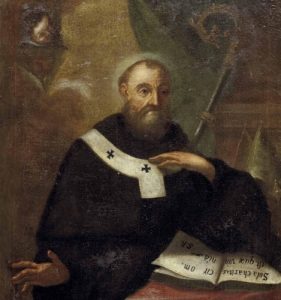Saint Fulgentius of Ruspe was born as Fabius Claudius Gordanius Fulgentius, in the year 465 AD in Thelepte, Roman province of Africa (modern-day Medinet-el-Kedima) Tunisia. He was once the procurator (mostly known as a tax collector) before becoming a monk and later a bishop of Ruspe. He died on January 1 527 or 533 AD in Ruspe, Kingdom of the Vandals. His feast Day is celebrated on January 1 of every year.
| Saint Fulgentius of Ruspe Biography | |
|---|---|
 |
|
| Date of Birth | 465 A.D |
| Place of Birth | Thelepte, Roman province of Africa, Tunisia |
| Profession | Tax collector, then a monk and later The bishop of Ruspe |
| Place of Work | Tunisia |
| Date of Death | January 1 either 527 or 533 |
| Place of Death | Ruspe, Kingdom of the Vandals |
| Feast Day | January 1 |
| Canonization | Pre congregation |
Saint Fulgentius of Ruspe Life History
Fabius Claudius Gordanius Fulgentius was born between 462 and 468 AD in Telepte, Tunisia, Africa, to a Roman senatorial family parents being, Claudius and Marina. Unfortunately for Fulgentius, his father passed away when he was at an early age.
As he grew up, his mother taught him Greek and Latin and as time went by his family reputation due to its conduct concerning their affairs, allowed him to acquire a post as a procurator or a tax collector of Byzacena. Living his life, he felt the vanity of the material life and this together with his religious studies, particularly a sermon from St. Augustine of Hippo on the Psalms, convinced him to become a monk at the age of 22.
In the year 499 AD, he moved to join the hermits in Thebaid, Egypt but later changed his mind once he discovered the effects of monophysism on the monastic life in Egypt. He then sought after joining Bishop Faustus’s monastery but was accepted on a trial basis due to his weak demeanor and was viewed as a poor candidate for the tough monastic life. Mariana, his mother, was however against his religious life choices and resorted to protest against the monastery. Her actions were in vain as her son got finally accepted to the monastery to pursue his vocation.
Frequent attacks on the area by Arian heretics forced them out of the monastery to another monastery whose abbot, Felix, honored him with the duty of managing the temporal affairs of the monastery while the abbot took care of the spiritual matters. Another wave of persecutions fell upon them and they had to flee to Sicca Veneria. A local priest once had them arrested and tortured, abbot Felix and Fulgentius, for preaching Orthodox Nicene teaching.
He and his superior went and built another monastery in the province they had abandoned.
His desire for solitude made him set out on a pilgrim to Rome where he visited and prayed in the holy tombs of the apostles and at the first rest in the persecutions, he returned to Africa.
In the year 508 AD, he was elected Bishop of Ruspe and not long after, was banished together with 60 other high ranking members of the clergy to Sardinia. He became spokesman of his brethren and the support of his orphaned flock though he was among the youngest of them all. During his banishment in Sardinia, he turned a house in Cagliari into a monastery.
After around 15 years, on the death of the Arian King, Thrasamund and his succession by Hilderic, he was able to return to his flock and on his arrival, he labored in the church councils, synods, to re-establish discipline.
When he felt his end was near, he retired to the island of Circinia, Kerkenna and after a year’s preparation, he in the presence of his clergy members distributed his belongings to the poor. He was then recalled to serve in Ruspe until his death on the 1st of January either the year 527 or 533 AD.
Saint Fulgentius Birth
Saint Fulgentius was born as Fabius Claudius Gordanius Fulgentius was born in Telepte in Tunisia, Africa between 462 and 468 AD.
Saint Fulgentius of Ruspe Death
He was believed to have died between the years 527 and 533 AD on the 1st of January due to causes unknown.
Family Background
His parents went by the names Claudius and Marina, though Claudius passed away when Fulgentius was at an early age hence was mostly raised by his single mother.
Canonization
Saint Fulgentius was beatified and canonized pre-congregation.
Venerated in
The saint is venerated in the following churches;
- Roman Catholic Church
- Eastern Catholic Churches
- Eastern Orthodox Churches
Major Works
Few of his known major works are;
- He was elected Bishop of Ruspe
- While in exile in Sardinia he converted a house there into a monastery
- He was responsible for the strengthening of Catholics in Africa and Gaul at the time and founded many churches in Sardinia and also Africa.
- He actively wrote against Arianism and Pelagianism.
Relics
His relics were transferred to Bourges, France in the year 714 AD and were later destroyed in the French Revolution.
Prayers
Saint Fiulgentius’ prayer to the Lord;
You know, Lord, what is most expedient for the salvation of our souls; assist us in our corporal necessities, that we may not lose the spiritual goods.
Quotes
Below is a quote from a letter by Saint Fulgentius to Saint Peter;
“Hold most firmly and never doubt that the same Holy Spirit, who is the one Spirit of the Father and the Son, proceeds from the Father and the Son. For the Son says, ‘When the Spirit of Truth comes, who has proceeded from the Father,’ where he taught that the Spirit is his, because he is the Truth.”
Powered By SEO Experts
Follow @ReadingCatholic